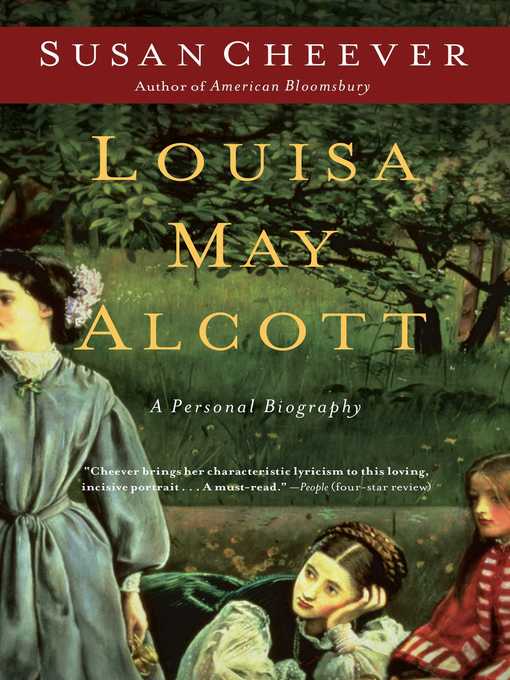
Louisa May Alcott
A Personal Biography
کتاب های مرتبط
- اطلاعات
- نقد و بررسی
- دیدگاه کاربران
نقد و بررسی

Starred review from September 20, 2010
Little Women was the idea of Alcott's publisher, who bullied her into writing it. Louisa may, Cheever speculates, have taken revenge on Bronson Alcott—a friend of the great Transcendentalists, but an irresponsible and browbeating father—by leaving him out of her semiautobiographical masterpiece. A revolutionary educator whose uncompromising high-mindedness made him a financial failure, Bronson was critical of and often punished the rebellious Louisa. But his close friendships with men like Emerson and Thoreau blessed Louisa with a unique circle of mentors, whom Cheever depicted in American Bloomsbury. Alcott gradually lost everyone dear to her: her beloved sister Lizzie died at 22, and her sister Anna's marriage felt like a betrayal. Struggling so hard for wealth and fame that when it came she was too ill and weary to enjoy it, Louisa never married and died two days after Bronson. Cheever laces this provocative biography with musings on the genesis of genius, and her identification with Jo March when she was a rebellious girl in the throes of puberty. While some may find Cheever's digressions and self-referencing grating, most will savor this work—surely a future book club staple—as keen, refreshing, and authoritative. 8 pages of b&w photos.

August 15, 2010
Contextual study of Louisa May Alcott's life (1832–1888) and work, from her childhood among such writers as Emerson, Fuller and Hawthorne, to the astounding literary career that afforded her a feminist independence of spirit even as she remained a caregiver to her family.
In this new biography, Cheever (MFA Program/Bennington Coll; Desire: Where Sex Meets Addiction, 2008, etc.) presents an insightful narrative of Alcott's life and how her experiences informed, but didn't dictate, her fiction. Raised in the culturally rich and progressive community of Concord, Mass., Alcott was an inquisitive and rebellious child who adored her three sisters and idolized her famous literary neighbors, particularly Emerson, who frequently played the role of benefactor to the often destitute family. Alcott's father was a hopelessly impractical academic and a domineering patriarch; she had a contentious relationship with him for most of her life and famously wrote him out of her classic, Little Women (1868). Despite these hardships, Alcott dreamed of becoming a writer. Amid the outbreak of the Civil War and her youngest sister's tragic death, Alcott wrote copious journal entries, poems and stories; at age 19 she published her first poem. Twelve years later, she joined the Union Army as a nurse in Washington, and the grisly, poignant experience catapulted her into adulthood and was integral to the development of her mature prose. She published a collection of letters she wrote while on duty to great acclaim and returned to Concord a rising literary star. Within five years she would write Little Women and become one of the most celebrated authors of her time, providing young girls with a novel distinguished by relatable story lines and characters, one that armed generations of readers with a sense of what is possible for women. Alcott was able to exemplify her belief that an unmarried woman could be intelligent, successful and, perhaps more importantly, happy. Throughout the narrative, Cheever allows Alcott's complex humanity to reveal itself slowly, drawing the reader into her iconic life.
Lively and astute.
(COPYRIGHT (2010) KIRKUS REVIEWS/NIELSEN BUSINESS MEDIA, INC. ALL RIGHTS RESERVED.)

September 1, 2010
Cheever, who has previously written about Alcott and her contemporaries in American Bloomsbury, uses primary sources (Alcott destroyed many of her personal papers, but luckily journals and letters survived), along with existing Alcott studies to paint a vivid portrait of her subject, sometimes decoding certain events through the lens of modernity as well as through her own experiences as the daughter, and observer, of John Cheever (Louisa May Alcott's father was the prominent Bronson Alcott). Yet this is a strategy that she also questions--"Can we apply a twenty-first century context for a few scraps of nineteenth-century journal?" The results make for great reading. Alcott's feminism, relationships, illnesses, struggles, and ultimate success have been discussed before, yet Cheever's stirring account provides an insightful interpretation of this fascinating woman. VERDICT An engaging biography, this is an important addition to Alcott scholarship. Highly recommended for all readers interested in Alcott's life and writings.--Erica Swenson Danowitz, Delaware Cty. Community Coll., Media, PA
Copyright 2010 Library Journal, LLC Used with permission.

September 15, 2010
The author of American Bloomsbury (2007), a collective biography of the extraordinary clutch of creative types who lived in nineteenth-century Concord, Massachusetts (Emerson, Thoreau, Hawthorne, etc.), Cheever revisits this familiar territory but this time focuses on only one of these talents, Louisa May Alcott. The author of Little Women seems to be an irresistible subject for biographers, since hers was a life filled with fascinating associations, an extraordinary family, poverty, dazzling success, declining health, and more (who says authors lives are dull?). Unfortunately, Cheever plows no new ground here and tacitly admits so by regularly acknowledging the more original work of earlier biographers. Too, she tends to inflate Alcotts literary importance, as in the case of her purported influence on Henry James. All that said, hers is a smoothly written and sympathetic introduction to this always fascinating woman who was both a celebrated writer and an early and stalwart champion of womens rights.(Reprinted with permission of Booklist, copyright 2010, American Library Association.)

























دیدگاه کاربران